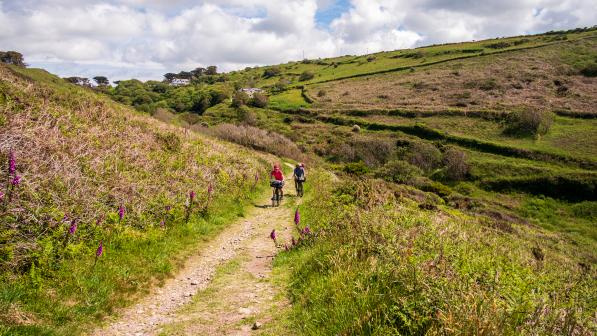Agricultural subsidies and why countryside access is a public good

This week, the government launched a formal consultation on its future agricultural policy. This is a hugely complex and technical area, and Cycling UK is already in discussion with other countryside user groups to hopefully agree the best way to respond, to ensure that the Government receives a loud and clear message that recreational access to the countryside is inherently beneficial to society, and that opportunities to improve and enhance access are not wasted.
The opportunities from a new agricultural funding model include the improvement of recreational multi-user links from urban areas to the wider countryside - particularly in the form of greenways, disused railway tracks, and improved access to National Trails for cyclists and horseriders.
Cycling UK believes that it's vitally important that public access is seen as something that sits hand-in-hand with conservation and biodiversity. Routes such as National Trails and disused railway lines can provide vitally important landscape scale wildlife corridors, as well as providing the perfect opportunity to better connect the public with nature. A funding model which brings together subsidies for improved public access and environmental stewardship payments would encourage farmers and other landowners to collaborate to make the countryside an even more welcoming place for people to visit and enjoy.
One of the greatest causes of the ecological crisis is the state of personal alienation from nature in which many people live.
- Robert Pyle, Environmentalist, 1978
The benefits of countryside recreation, not only to physical health but also to mental health and wellbeing, are well proven. Additionally, with an increasingly urban society, the importance of connecting people with nature is growing, with air pollution and climate change highlighting the huge importance of fostering an understanding of and care for the natural environment.
Natural England’s statistical research tells us that roughly one third of recreational cycling in the countryside is off-road and mountain biking, mostly on Britain thousands of miles of public rights of way. Nationally, the proportion of cyclists usually cycling off the road in parks, open country or private land has increased over the last ten years, (from 19% in 2006 to 24% in 2016). Our Rides of Way report told us that 66% of rides on rights of way begin from the front door, which shows why effective rights of way and access networks on the urban fringe are so important to enable people to ride safely from urban areas to access the wider countryside. Cycling UK has a clear vision for improved cycling provision and participation in rural areas. We want to ensure that more people can enjoy the countryside by bike, both on- and off-road, and believe that by doing this we can not only help to secure huge health and wellbeing benefits, but also play an important part in promoting the fragile rural economy.
As the Environment Secretary points out, this consultation is only the beginning of the conversation.
- Duncan Dollimore, Cycling UK's Head of Campaigns
Duncan Dollimore, Cycling UK’s Head of Campaigns said: “As the Environment Secretary points out, this consultation is only the beginning of the conversation. It’s Cycling UK’s role now to make sure the views of our members and the off-road cycling community are therefore heard and part of the ongoing discussion.
“Encouragingly for lovers of our countryside, Mr Gove appears to see improved access as a public good. That’s precisely the position Cycling UK has outlined in our Beyond the Green Belt vision, and over the coming months we’ll be outlining how and where public money should be invested to increase access, and why this will benefit not just people cycling, but also the rural economy,”
About Beyond the Green Belt:
Beyond the Green Belt is Cycling UK’s vision for rural cycling. The legislation affecting the provision of off-road and on-road cycling may differ, but there are also significant crossovers. Much of the rights of way network cannot be linked together without using rural roads, and some rights of way offer important traffic free green links between villages and utility destinations such as schools and railway stations. Alongside this, other concerns such as speed limits and traffic calming measures would perhaps traditionally have been thought of as issues for road or urban cycling campaigns. Beyond the Green Belt is designed to bring those areas of campaigning together, with rural cycling looked at holistically.
Over the next year Cycling UK will be highlighting the issues to address both on and off-road, and potential solutions to achieve our vison for rural cycling. We will also be producing and launching a toolkit of documents to help others help us to do this. We hope that you will find them useful and engaging, but more importantly, we hope that you will use them, and join us in our campaign to improve rural cycling provision in your own backyard.



